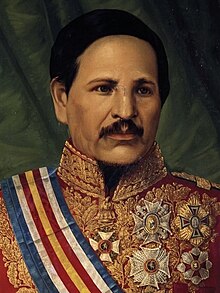This article needs additional citations for verification. (October 2018) |
Rafael Carrera y Turcios | |
|---|---|
 | |
| 1st President of Guatemala | |
| In office 6 November 1851 – 14 April 1865 | |
| Preceded by | Mariano Rivera Paz |
| Succeeded by | Pedro de Aycinena y Piñol |
| In office 21 March 1847 – 17 August 1848 | |
| Preceded by | Position established |
| Succeeded by | Juan Antonio Martínez |
| 4th State President of Guatemala | |
| In office 4 December 1844 – 21 March 1847 | |
| Preceded by | Mariano Paredes |
| Succeeded by | Position abolished |
| Personal details | |
| Born | 24 October 1814 Guatemala City, Kingdom of Guatemala, New Spain |
| Died | 14 April 1865 (aged 50) Guatemala City, Guatemala |
| Political party | Conservative |
| Spouse | Petrona Garcia Morales de Carrera |
| Children | José, Francisco, María Mercedes Carrera García |
| Parent | Simón Carrera y Juana Turcios |
| Residence(s) | Mataquescuintla, Guatemala City |
| Occupation | Military |
| Signature |  |
José Rafael Carrera y Turcios (24 October 1814 – 14 April 1865) was the president of Guatemala from 1844 to 1848 and from 1851 until his death in 1865, after being appointed President for life in 1854. During his military career and presidency, new nations in Central America were facing numerous problems: William Walker's invasions, liberal attempts to overthrow the Catholic Church and aristocrats' power, the Civil War in the United States, Mayan uprising in the east, Belize boundary dispute with the United Kingdom, and the wars in Mexico under Benito Juárez. This led to a rise of caudillos, a term that refers to charismatic populist leaders among the indigenous people.[1]
Backed by the Catholic Church, conservatives of the Aycinena clan led by Juan José de Aycinena y Piñol, and mestizo and indigenous peasants, he dominated politics in the first three decades of Guatemala's independence more than any other individual.[2] He led the revolt against the liberal state government of Mariano Gálvez in Guatemala, and then was instrumental in breaking up the Federal Republic of Central America that the liberals wanted.[Note 1] As a result, once the liberals took over power in Guatemala in 1871, Carrera's character and regime were dismissed and demonized, making him look as an illiterate who could not even write his own name and was a puppet of the aristocrats.[3][4] Over the years, even Marxist writers who wanted to show how the native Guatemalans have been exploited by the elites completely ignored Carrera's interest in them and accused him of racism and being a "little king".[5][6]
- ^ Adas, Stearns & Schwarz 2009, p. 77.
- ^ Woodward 1993, p. 456.
- ^ Rosa 1974.
- ^ Montúfar & Salazar 1892.
- ^ Martínez Peláez 1990.
- ^ Martínez Peláez 1988.
Cite error: There are <ref group=Note> tags on this page, but the references will not show without a {{reflist|group=Note}} template (see the help page).